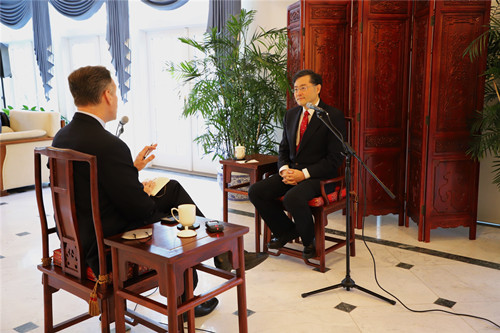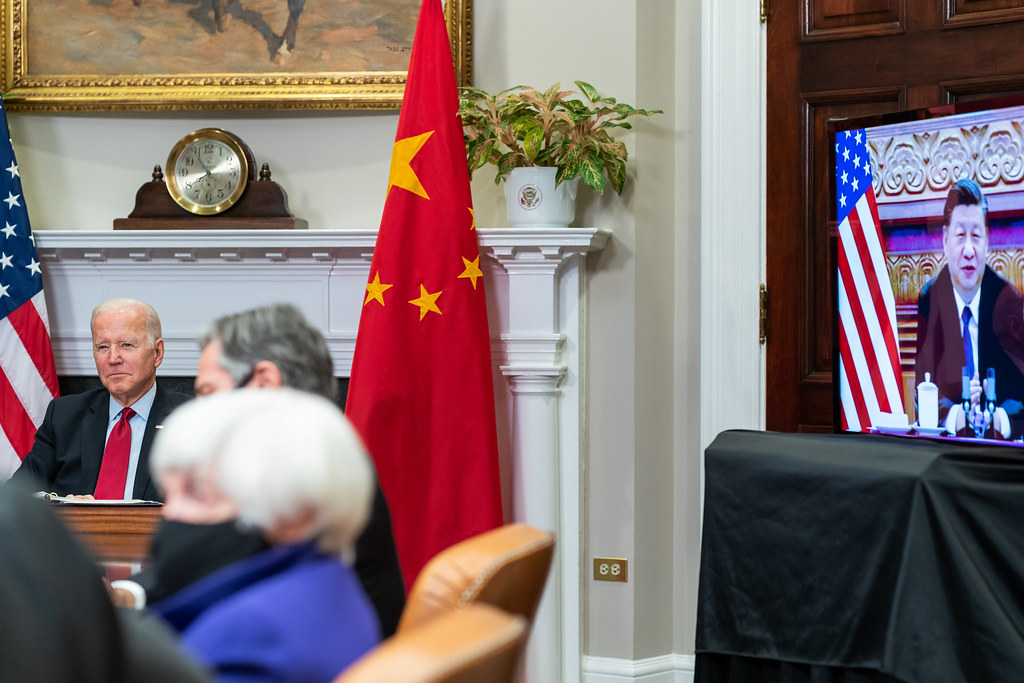Cover Image: US Embassy & Consulates in Italy (Public Domain)

Research Associate & Program Officer

Research Associate & Administrative Officer
Media coverage on both sides of the Pacific mischaracterized the most recent sets of high-level engagements between the United States and China. For example, western sources typically overemphasized discussions surrounding the Ukraine crisis even though it was only one major part.
Both the White House and Chinese Ministry of Foreign Affairs readouts of the Yang-Sullivan meeting in Rome on March 14 and Biden-Xi virtual call were more than just “warning of consequences” or “reiteration of positions”, but rather an engaging process that revealed both the differences and shared views between the two countries.
While western media searches for evidence proving that China has formally sided with Russia, China has so far maintained a consistent, albeit murky, position on the Ukraine crisis. China’s messaging has been conveyed messily in the West due to a lack of clarity from China itself and a lack of reporting on China’s perspective from western media. Nevertheless, misinterpreting China’s position will have serious negative implications for the development of a productive U.S.-China relationship.
For its part, China has done little to ease the West’s fears, beginning with its decision to abstain from a key U.N. Security Council vote at the outset of the invasion that aimed to officially condemn Russia for infringing upon Ukrainian territorial integrity and sovereignty. The West’s frustrations have grown over Chinese media pushing propaganda, such as disinformation campaigns initiated by Russia. On the other hand, western media have also overly focused on the negative side of the U.S.-China engagement over the crisis, further muddling China’s stance.
The Biden administration recognizes it will be able to, and in some cases need to, work with China, but can only do so in the areas where interests intersect. Anything more than that will require significant negotiation and potential concessions if China is to be convinced to act outside of its self-interest. Biden must determine whether securing Xi’s potential ability to rein in Putin and bring him to the negotiating table in a meaningful way to end the bloodshed is worth the costs.
Contrary to the image portrayed by the media, the two recent engagements between China and the U.S. are, in fact, more constructive than they have been in a long time. Overlooking a positive trend, no matter how small a step it might be, risks missing a crucial moment of restoring healthy bilateral engagement between the world’s two largest economies and militaries.
As the West looks with horror upon the destruction Russia has unleashed in Ukraine, a strong sense of foreboding has emerged that China may be emboldened to side more directly with Russia. Not so unexpectedly, comparisons are being made between Russia’s use of direct military force in Ukraine with the potential that China may take a similar approach to achieve its goal of reunification with Taiwan. There is a prevailing belief that China is actively taking notes on how to deal with reclaiming Taiwan from studying the actions of Putin and the reactions of the West. On March 14, 2022, National Security Advisor Jake Sullivan met with Yang Jiechi, Director of the Office of the Foreign Affairs Commission, shortly after the Biden administration claimed that Russia had actively sought Chinese military and economic assistance. The media wasted no time concluding that China is seriously considering taking sides with Russia. The way this meeting was portrayed, one would think that the two sides discussed the Russia-Ukraine conflict for the entire seven hours, which could not be further from the truth.
According to a senior U.S. administration official, the meeting between Yang and Sullivan, the first in five months, had been planned for quite some time. Given the timing of the meeting, amid claims from the U.S. that Russia had requested from China military equipment and economic aid to lessen the impact of sanctions, the timetable for this meeting may have been moved up for the U.S. side to address these imminent concerns. Whatever the case may be, the slew of western media reports following the talk’s conclusion would have one think that very few other matters were discussed in this seven-hour meeting. In comparison, Chinese media reports and the MOFA press release significantly diminished the Ukraine issue’s mention. A much larger emphasis was placed on reiterating China’s position on Taiwan and America’s involvement. Although the Russia-Ukraine conflict was undoubtedly a key topic, it is a mischaracterization of the underlying purpose of their engagement and serves to diminish other critical areas of negotiation.
The subsequent virtual meeting between President Biden and President Xi on March 18, 2022, was similarly misportrayed. Although readouts from both governments showed that the discussion covered a wide range of topics, western media coverage of the event laser-focused on President Biden’s reiteration of “implications and consequences if China provides material support to Russia” to his Chinese counterpart. The two readouts indicated that the Ukraine issue was a vital issue of discussion but not the only issue on the table. Moreover, it is more important to highlight that the two leaders’ discussion on the Ukraine crisis was more than just “warning of consequences” or “reiteration of positions”, but rather an engaging process that revealed both the differences and shared views between the two countries.

Despite their lack of tangible outcomes, both meetings were critical to beginning the effort of restoring constructive and, potentially, productive U.S.-China bilateral engagement after a devastating five-years of bitter freefall. The mischaracterization of the most recent U.S.-China engagements overshadowed important messages and overamplified differences between the two countries. The public needs to have a less-sensationalized picture of where China stands on the Ukraine crisis and where the interests of each party collide and intersect. The central elements of the two recent high-level U.S.-China engagements prevent the misrepresentation of media coverage that propagates hostile rhetoric. This is not to say that criticism does not have its place. But the way the media have handled things on both sides of the Pacific is counterproductive to promoting U.S.-China engagement for the peaceful resolution of the Ukraine crisis and the management of differences that provide common-sense guardrails for the bilateral relationship.
While western media searches for evidence proving that China has formally sided with Russia, China has so far maintained a consistent, albeit murky, position on the Ukraine crisis. On the one hand, China has repeatedly urged both sides of the conflict to remain calm and has called for a peaceful resolution of the crisis. On the other hand, China views the crisis as the consequence of a string of complicated factors. China sees the U.S. and its western allies’ increasing expansion of NATO as a serious, if not the determining, factor that led to the outbreak of the conflict. Such a view of the U.S. and West on the Ukraine crisis has partially contributed to China’s reluctance to fully side with the west and denounce Russia. China’s frustrations with the U.S.-led security alliance and belief that the West has overused sanctions marks the primary divergences over the Ukraine crisis between China and the U.S.
China’s stated position indicates that it does not stand totally against the U.S. and the west, but rather similar to a considerable number of countries that see the crisis from a different angle. The primary split between Beijing and the West is its failure to condemn a blatant infringement on Ukraine’s sovereignty and territorial integrity and its subsequent disapproval of Russia being sanctioned. Many consider this refusal a sign of inherent support or acquiescence of Kremlin’s actions. That is not the case. Looking at the vote result of the March 2 UN General Assembly resolution, there were essentially four main camps. The first being western-aligned countries like the U.S., the UK, EU members, and various other major developed nations that were vocal in condemning Russia and quick to slap sanctions as punishment. The second camp, which is essentially the majority, comprises much of the Global South and middle powers like South Africa, Brazil, and Mexico, who were willing to condemn Russia but were unwilling to sanction them immediately. The third camp comprised major developing countries with close ties to Russia, including China and India, who were unwilling to condemn or sanction Russia, but implicitly admitted that violations of international norms had taken place. And lastly, the fourth basket included Belarus, North Korea, Eritrea, and Syria, who voted ‘no’ to the resolution in favor of Russia. Beijing’s position is indeed complicated but cannot be simply viewed as “having Putin’s back”. The complicated position is a mixture of China’s long-standing foreign policy principles and its grievances towards the U.S. and the west, which is essential to provide a complete picture of China’s logic and decisionmaking.
China’s grievance towards the U.S.-led regional multilateral security alliance is not new. Beijing has long viewed U.S.-led security alliances such as the North Atlantic Treaty Organization (NATO) and AUKUS as a product of a “Cold War mentality” that serves to reinforce “U.S. global hegemony”. Such a view is maintained regardless of the ongoing conflict in Ukraine. Chinese vice foreign minister Le Yucheng, on March 19, called NATO a “Cold War vestige” and warned that its expansion could cause “repercussions too dreadful to contemplate”. As the two countries’ strategic competition for global influence grows, China increasingly views NATO expansion as “typical bloc politics” and that the U.S., an external actor, is interfering with regional security.

Prior to the Ukraine Crisis, China and Russia released a joint statement following President Putin’s meeting with President Xi Jinping in Beijing before the Winter Olympics. In the statement, Beijing and Moscow expressed their shared goal to “effectively counter external interference and threats to regional security, and maintain international strategic stability”. A day before Russia announced its military actions against Ukraine, the spokesperson of the Chinese Foreign Ministry, Hua Chunyin, criticized the U.S. meddling with regional stability. She said:
Certain countries should ask themselves: When the US drove five waves of NATO expansion eastward all the way to Russia’s doorstep and deployed advanced offensive strategic weapons in breach of its assurances to Russia, did it ever think about the consequences of pushing a big country to the wall?
After the crisis spiraled into an intense armed conflict, China has maintained a consistent view that the U.S. “Cold War mentality” is partially responsible for the situation. Moreover, in line with China’s long-standing criticism of America’s use of unilaterally imposed sanctions, China argues that imposing excessive sanctions will further exacerbate the crisis by backing Russia into a corner. After China abstained from voting on the U.S.-sponsored UN Security Council resolution condemning Russia, China’s Permanent Representative to the UN, Amb. Zhang Jun, reiterated this view in his remarks:
The final settlement of the Ukraine crisis requires abandoning the Cold War mentality, abandoning the logic of ensuring one’s own security at the expense of others’ security, and abandoning the approach of seeking regional security by expanding military blocs. It is important to give full attention and respect to the legitimate security concerns of all countries, and on that basis conduct negotiations to put in place a balanced, effective and sustainable European security mechanism. Blindly exerting pressure and imposing sanctions and creating division and confrontation will only further complicate the situation, and result in a rapid negative spillover of the crisis, and affect even more countries.
Although China’s position for a peaceful resolution of the Ukraine crisis and its longstanding grievances towards the U.S. and the West are not inherently self-contradicting, Beijing’s inability to communicate effectively with both the western public and officials has put it in a tough position. As a result, the West increasingly views Beijing as acquiescing Russia over the Ukraine crisis.
For its part, China has done little to ease the West’s fears, beginning with its decision to abstain from the March 2 U.N. Security Council vote at the outset of the invasion. Additionally, there was a prevailing belief that the timing of Putin’s decision to hold off until after the Beijing Olympics had concluded to invade could indicate that China had some prior knowledge or had even formally requested that Russia wait. Conversations within the Chinese policy community and official government statements indicate the contrary, as well as suggest that China itself might have been played by Russia. Whatever the case, since then, the Chinese government has carefully refrained from aligning the language it uses to describe the conflict with the West and disparaging the use of sanctions to punish Russia. Beijing recognizes the precarious position that it is in, which would make it look hypocritical for siding directly with Russia or the West. By decisively siding with the West on the Ukraine issue and denouncing Putin, any future action China takes to threaten the use of force to reunify with Taiwan would naturally make it look massively hypocritical. However, if China were to decisively side with Russia, China would show inconsistency in promoting its value of respecting sovereignty and territorial integrity.
China has attempted to appear neutral on the world stage despite each side vying for its support. On the one hand, China has voiced similar grievances that Russia also has with NATO, particularly as it worries about the development of the Quad and formalized alliances such as AUKUS. Although the Quad is nowhere near close to becoming an “Asian NATO”, it has not been ruled out by Beijing as having the future potential to eventually encircle China both economically and militarily in a similar manner that Russia has claimed NATO has done to it. Yet, on the other hand, China has announced it desires a ceasefire and an end to the destruction. As a result, neither side has been satisfied with China’s actions and remains wary of its leanings. Until recently, with the release of Chinese Ambassador Qin Gang’s Op-Ed in the Washington Post, China’s messaging has been conveyed messily in the West due to a lack of clarity from China itself and a lack of reporting on China’s perspective from western media. He writes:
China’s position is objective and impartial: The purposes and principles of the U.N. Charter must be fully observed; the sovereignty and territorial integrity of all countries, including Ukraine, must be respected; the legitimate security concerns of all countries must be taken seriously; and all efforts that are conducive to the peaceful settlement of the crisis must be supported.

Ambassador Qin’s attempt to clarify China’s position in this conflict has been met with criticism due to its inherent contradictions, even from citizens from back home in some cases. His carefully selected verbiage was consistent with China’s long espoused non-interference foreign policy principle, enacted in 1955 by the People’s Republic of China’s first Premier, Zhou Enlai. However, the West remains highly skeptical of China’s unwillingness to take more significant action in encouraging efforts “conducive to the peaceful settlement of the crisis” and the prevailing belief that China has seriously considered providing economic and military equipment support to Russia. This Western skepticism was evidenced by Amb. Qin’s subsequent interview on Face the Nation, where he was repeatedly pressed to respond to accusations that, intentionally or not, China’s refusal to condemn the Russian invasion of Ukraine served to condone it.
The position of diplomatic power that China currently holds due to its relationship with Russia naturally comes at the price of being put in the crosshairs of public opinion. Taking any open action supporting either side would open China up to criticism from the West on its handling of other human-rights issues, particularly on Xinjiang and Hong Kong. Yet, by not taking enough action to the degree that the West would prefer, Americans view this inaction as quiet support for Russia, particularly as many believe that China could help serve as a “cease-fire broker between Russia and Ukraine.” In the same NPR interview, Wang Huiyao, the director of CCG, a Communist Party-affiliated think tank in Beijing, suggested that China could even push for having Five-Party talks (Russia, Ukraine, EU, U.S., China). At this time of writing, the Chinese government has not made any apparent attempts in doing so. Instead, the West has a growing frustration over the continued propaganda from Chinese media pushing the Ukraine biolab disinformation campaign initiated by Russia, which was even echoed during the Yang-Sullivan meeting in Rome by Chinese officials.
China’s interests in the ongoing war in Ukraine are different from both Russia’s and the West’s, despite sharing some overlap with both sides. This is exemplified by comparing the readouts of the Sullivan-Yang meeting in Rome released by the White House and China’s Ministry of Foreign Affairs (MOFA). The White House’s brief description of the event focused largely on the Ukraine issue. The way this meeting was portrayed, particularly by Western reporting, one would think that the two sides discussed the Russia-Ukraine conflict for almost the entire seven hours. Looking at MOFA’s readout and subsequent Chinese language reporting, it becomes clear how much more was discussed. Far greater emphasis was placed on China reiterating its long-standing grievances against the U.S. on how it has addressed Taiwan, Hong Kong, and Xinjiang over the last several years. There was some mention of the Ukraine issue, but it was not emphasized.
Western media mischaracterized the Yang-Sullivan Rome meeting and the following Biden-Xi call that overlooked other vital matters of discussion that are critical to the long-term development of the U.S.-China relationship. Although the White House readout provided little detail on the matter of their seven-hour discussion, the Chinese readout revealed more detail of a wide range of issues being discussed in Rome. Yang and Sullivan not only had a “substantial discussion of Russia’s war against Ukraine,” but also touched on issues including Taiwan, Xinjiang, Tibet, Hong Kong, which covered many of the long-time differences between China and the U.S. over issues such as territorial sovereignty and integrity and human rights. As was mutually agreed by leaders of the two countries, both sides also stated their continued commitment to maintaining an open line of communication and engagement. However, most importantly, the readout highlighted that the Chinese side has explicitly called for cooperation. The MOFA readout stated:
… seeking common ground while shelving differences and building a bridge of cooperation on top of proper settlement of differences is the right way for China and the United States to get along with each other, which has been tested by practice since the Shanghai Communique was issued 50 years ago.
While the media has focused on the differences between Beijing and Washington over Ukraine, a potential move to extend an olive branch, should conditions be met, was largely ignored.

Similar rhetoric can also be seen from the virtual meeting between President Biden and President Xi. While the headlines focused on Biden warning Xi about supporting Russia, the U.S. readout revealed that the two presidents actually held a more constructive discussion over various issues. The two leaders continued the discussion over the issues discussed by Yang and Sullivan in Rome and went further and discussed shared concerns over transnational challenges such as health security and climate change. The readout wrote:
He [President Biden] raised specific transnational challenges where our interests intersect, such as health security. In particular, the two leaders discussed the existential nature of the climate crisis to the world and the important role that the United States and the PRC play. They also discussed the importance of taking measures to address global energy supplies. The two leaders also exchanged views on key regional challenges, including DPRK, Afghanistan, and Iran.
Contrary to the image portrayed by western media, the two recent engagements between China and the U.S. are, in fact, more constructive. Overlooking a positive trend, no matter how small a step it might be, while also over-emphasizing the two countries’ differences over the Ukraine crisis, risks missing a crucial moment of restoring healthy bilateral engagement between the world’s two largest economies and militaries.
The Biden administration recognizes it will be able to, and in some cases need to, work with China, but can only do so in the areas where interests intersect. Anything more than that will require significant negotiation and potential concessions if China is to be convinced to act outside of its self-interest. Given the enormous emphasis on Taiwan in MOFA’s readout of the Yang-Sullivan meeting in addition to mentions of Xinjiang, Tibet, and Hong Kong, it is clear where China’s interests are and where requests for concessions might be made for its support in the Ukraine issue or for other areas of international importance like the North Korean nuclear issue, the Iranian nuclear issue, and Afghanistan. And for Ukraine, it is up to Biden to determine whether securing Xi’s potential ability to rein in Putin and bring him to the negotiating table in a meaningful way to end the bloodshed is worth the costs.
Apart from the Ukraine crisis, U.S.-China discussion over other critical fundamental issues appeared constructive. Both sides “agree to disagree” and seek to manage their differences more effectively by pursuing areas where interests do align. Mischaracterizing the recent two engagements and overemphasizing the two countries’ differences over Ukraine risks producing an overly negative depiction that is counterproductive to rebuilding a constructive U.S.-China relationship. On either side, criticism from the media is inevitable and can even be productive, but only when the facts presented are accurate.

The Institute for China-America Studies is an independent nonprofit, nonpartisan research organization dedicated to strengthening the understanding of U.S.-China relations through expert analysis and practical policy solutions.
1919 M St. NW Suite 310,
Washington, DC 20036
icas@chinaus-icas.org
(202) 968-0595
© 2024 INSTITUTE FOR CHINA-AMERICA STUDIES. ALL RIGHTS RESERVED.
Slamming the door on diplomacy over surveillance balloon is reckless, not resolute